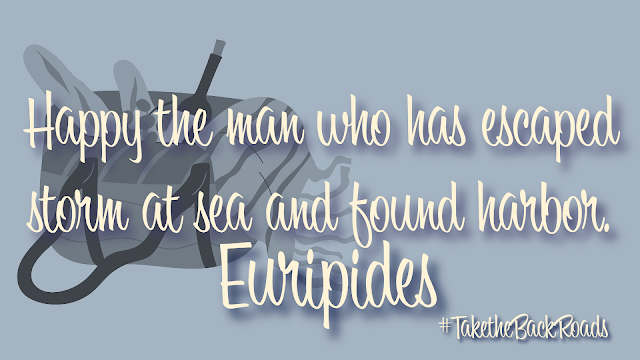The Bucket List Book Adventure: Book 14 - Bacchae
Dear Henry,
Book 14, Euripides "Bacchae" of the Bucket List Book Adventure (read about that here), is done! Let me tell you all about it.
Bacchae was one of the final plays of Euripides (c484-406 BC) and was not performed at the Festival of Dionysus until 405 BC, a year or so after his death, and would win the festival that year. So far, in my limited reading of ancient Greek literature, I have come to the opinion that of the three great tragedians - Sophocles, Aeschylus, and Euripides, Euripides wrote the darkest work. (Aeschylus' "Ajax" was pretty darned dark too) "Hippolytus" made me say 'wow,' but Euripides's play "Bacchae" really hit close to home.
The play is about the god Dionysus's interaction with Theban Cadmus, his daughter Agave, and his grandson King Pentheus. Dionysus had a beef with all three.
Dionysus was the son of Zeus and the mortal woman Semele, who was also a daughter of Cadmus. Hera found out about the affair and convinced Semele to look upon Zeus in his true form, which killed her. Zeus saved his unborn son, incubating him in his thigh and keeping him hidden from Hera. Agave, Semele's sister, always maintained that Semele was guilty of blasphemy, and that was why she died.
Dionysus spent his early years in Asia, gathering a group of voluntary followers called Bacchae before he came to Thebes, and had developed quite a reputation before appearing in Greece. The play begins when Dionysus and his Bacchae arrive at Thebes, although Dionysus is disguised as a priest and goes by The Stranger.
Despite all of the chaos, King Pentheus is curious about the worship of the Dionysus that he engages "The Stranger." Dionysus immediately seduced the young king, convincing him to dress as a woman to avoid detection and climb a tree to see better. As soon as King Pentheus is trapped in the tree, Dionysus alerts the Maenads and Bacchae that a traitor is in their midst. The Maenad/Theban women surround the tree, pull down King Pentheus, and tear him to shreds. Literally. Agave was the most brutal and led the attack. In the morning, Agave returns home carrying the head of a mountain lion (aka the head of her son Pentheus) that she plans to mount and hang over the fireplace. Cadmus confronts Agave, who finally comes to her senses and realizes whose head she has in her hands. Everyone realizes they have been smitten by a god.
Dionysus completes his smiting by sending Agave and her sisters into exile and turning Cadmus and his wife into snakes.
Intoxicated people behave very badly when intoxicated, and I think this play does an excellent job of showing it. Too often, Dionysus is represented as the happy-go-lucky frat boy who spreads wine and charcuterie boards wherever he goes. But that isn't accurate and is how one finds themselves drawn into his "worship." He is the god of chaos, destruction through intoxication, and poisonous sexuality. He is the god of my parents, of the man who hit me in "the accident," and I've barely survived the damage his worship can cause. This "god" (demon?) was one of the biggest motivators behind my conversion to Catholicism (read about that here), and this play removed any doubts that I made the right decision by moving away and cutting off contact. This play touched several of my scars.
Next up is Herodotus's "Histories," and it's really turning into a challenging read.
Stay tuned!
xoxo a.d. elliott
****** *********************************
a.d. elliott is a wanderer, photographer, and storyteller living in Salem, Virginia.
In addition to her travel writings at www.takethebackroads.com, you can also read her book reviews at www.riteoffancy.com and US military biographies at www.everydaypatriot.com
Her online photography gallery can be found at shop.takethebackroads.com
#TaketheBackRoads
Like my page? Please consider supporting my work by visiting my sponsors and webshop or buying me a cup of coffee!








Comments
Post a Comment